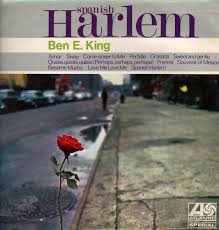Spanish Harlem (song)
1960 song by Ben E. King From Wikipedia, the free encyclopedia
"Spanish Harlem" is a song recorded by Ben E. King in 1960 for Atco Records. It was written by Jerry Leiber and Phil Spector and produced by Jerry Leiber and Mike Stoller. "Spanish Harlem" was King's first hit away from The Drifters, peaking at number 15 on Billboard's rhythm and blues and number 10 in pop music chart.[1]
| "Spanish Harlem" | ||||
|---|---|---|---|---|
 | ||||
| Single by Ben E. King | ||||
| from the album Spanish Harlem | ||||
| A-side | "First Taste of Love" (original 1960 release) | |||
| B-side | "First Taste of Love" (later releases) | |||
| Released | December 1960 | |||
| Genre | Soul | |||
| Length | 2:53 | |||
| Label | Atco | |||
| Songwriter(s) | ||||
| Producer(s) | Jerry Leiber and Mike Stoller | |||
| Ben E. King singles chronology | ||||
| ||||
The song has been covered by a number of artists including Aretha Franklin, whose version reached number two on Billboard's pop chart. The song was ranked number 358 on Rolling Stone's list of the "500 Greatest Songs of All Time".[2]
Background
Summarize
Perspective
Leiber credited Stoller with the arrangement in a 1968 interview;[3] similarly, Leiber said in a 2009 radio interview with Leiber and Stoller on the Bob Edwards Weekend talk show that Stoller had written the key instrumental introduction to the record, although he was not credited. Stoller remarks in the team's autobiography Hound Dog that he had created this "fill" while doing a piano accompaniment when the song was presented to Ahmet Ertegun and Jerry Wexler at Atlantic Records, with Spector playing guitar and Leiber doing the vocal. "Since then, I've never heard the song played without that musical figure."[3] The song was arranged by Stan Applebaum, featuring Spanish guitar, marimba, drum-beats, soprano saxophone, strings, and a male chorus.[citation needed]
The riff to the song was originally conceived by Spector and his then-girlfriend Beverly Ross. She was apparently shocked to discover the same riff a few months later in the version sung by King.[4][5]
Ben E. King's "Spanish Harlem" was originally released as the B-side to "First Taste of Love".[6] "Spanish Harlem" was King's first hit away from The Drifters, a group that he had led for several years. It climbed the Billboard charts, and peaked at number 15 for rhythm and blues and number 10 in pop music.[7] King's version was not a hit in the United Kingdom.[8] The song was re-released in 1987, after "Stand By Me" made number 1.[8]
Aretha Franklin version
Summarize
Perspective
| "Spanish Harlem" | ||||
|---|---|---|---|---|
| Single by Aretha Franklin | ||||
| from the album Aretha's Greatest Hits | ||||
| B-side | "Lean on Me" | |||
| Released | July 9, 1971 | |||
| Recorded | 1971 | |||
| Genre | Soul | |||
| Length | 3:30 | |||
| Label | Atlantic | |||
| Songwriter(s) | ||||
| Producer(s) | Jerry Wexler, Arif Mardin, Tom Dowd | |||
| Aretha Franklin singles chronology | ||||
| ||||
In July 1971, Aretha Franklin released a cover version of the song that outperformed the original on the charts and in which Franklin changed the lyrics slightly: from "A red rose up in Spanish Harlem" to "There's a rose in Black 'n' Spanish Harlem. A rose in Black and Spanish Harlem.” Her version went to number one on the US Soul charts for three weeks and number two on the Pop charts for two weeks,[9] barred from the top spot by "Go Away Little Girl" by Donny Osmond.[10] This version also hit number six on Billboard's Easy Listening chart.[11] Aretha Franklin's version earned a gold single for sales of over one million. Dr. John played keyboards on Franklin's version with Bernard "Pretty" Purdie on drums and Chuck Rainey on bass.[12]
Charts
| Chart (1971) | Peak position |
|---|---|
| Belgium (Ultratop 50 Flanders)[13] | 4 |
| Belgium (Ultratop 50 Wallonia)[14] | 25 |
| Canada Top Singles (RPM)[15] | 5 |
| Netherlands (Single Top 100)[16] | 1 |
| UK Singles (OCC)[17] | 14 |
| US Adult Contemporary (Billboard)[18] | 6 |
| US Best Selling Soul Singles (Billboard)[19] | 1 |
| US Billboard Hot 100[20] | 2 |
| West Germany (GfK)[21] | 6 |
Cliff Richard versions
Cliff Richard released his rendition on his 1962 album 32 Minutes and 17 Seconds. He also recorded a German version, titled "Das ist die Frage aller Fragen", with lyrics by Carl Ulrich Blecher, that was a number one hit in Germany and Austria in 1964,[22][23] as well as a number one hit in Switzerland in 1965.[citation needed]
Charts
| Chart (1962–64) | Peak position |
|---|---|
| Austria (Ö3 Austria Top 40)[24] | 1 |
| Belgium (Ultratop 50 Wallonia)[25] | 28 |
| West Germany (GfK)[26] | 1 |
Laura Nyro version
On her 1971 covers album Gonna Take a Miracle, singer-songwriter Laura Nyro performed a version with backing vocals by the group Labelle.[27]
Other recordings
References
Wikiwand - on
Seamless Wikipedia browsing. On steroids.
